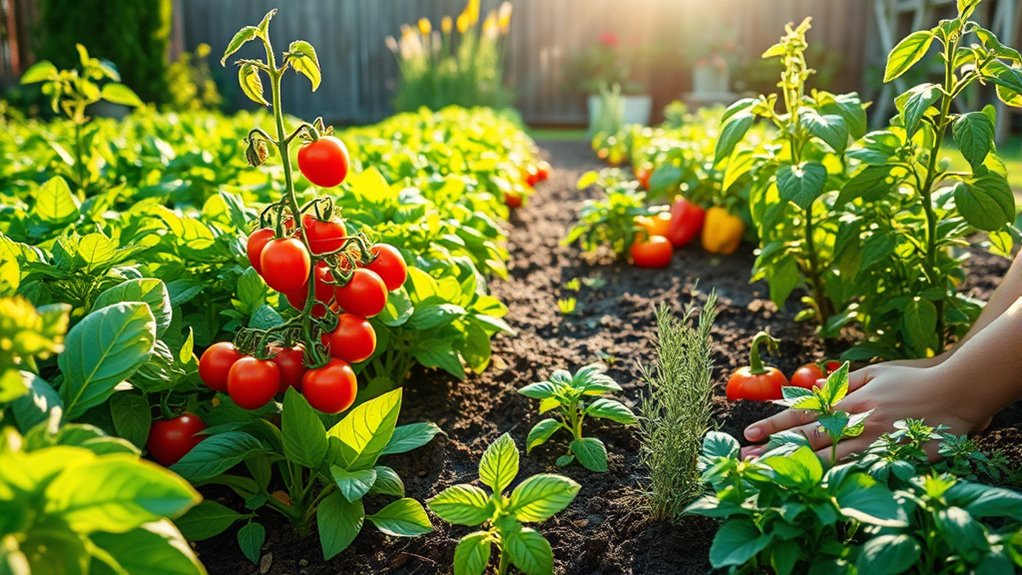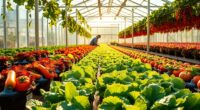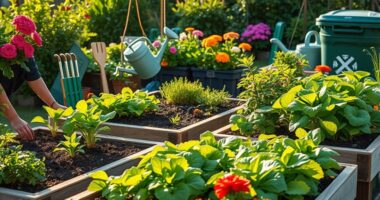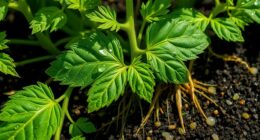Growing your own food improves your health by providing fresh, nutrient-rich produces you control. It saves money by reducing grocery bills and allows you to choose organic methods that are safer and eco-friendly. Gardening also boosts physical activity, helping you stay active and fit, while offering mental benefits like stress relief and a peaceful connection with nature. As you explore more, you’ll discover how growing food benefits both your wallet and well-being in many ways.
Key Takeaways
- Growing your own food provides access to fresh, nutrient-rich produce while reducing reliance on chemical pesticides for safer, healthier eating.
- Home gardening cuts grocery costs significantly by producing high-yield crops and utilizing budget-friendly methods like composting and recycled containers.
- Gardening promotes physical activity, improving fitness, strength, and flexibility through tasks like digging, watering, and harvesting.
- Cultivating a garden enhances mental well-being by offering a calming connection to nature and stress-relieving outdoor activity.
- Growing food supports environmental sustainability by reducing waste, lowering carbon footprint, and attracting pollinators through biodiverse planting.
Enhancing Your Nutritional Intake
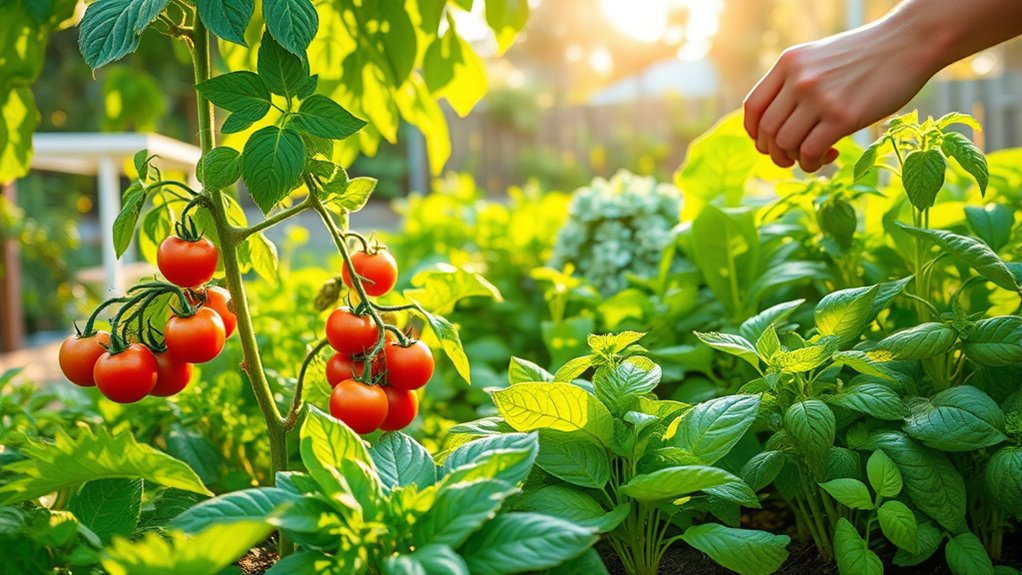
Growing your own food is a practical way to enhance your nutritional intake, guaranteeing you have access to fresh, nutrient-rich produce. Healthy soil forms the foundation for nutrient-dense crops, so focusing on soil health is essential. By enriching your soil with organic matter and avoiding chemicals, you create ideal conditions for plants to thrive. Implementing vertical storage solutions in your garden can also optimize space and improve organization for tools and supplies. Incorporating crop diversity into your garden not only prevents soil depletion but also introduces a wider range of vitamins and minerals into your diet. Aquatic exercise can be a helpful complementary activity for maintaining overall health as you garden. Different plants contribute unique nutrients, making your meals more balanced and wholesome. Plus, crop diversity helps control pests naturally and reduces disease risk. Taking care of soil health and planting a variety of crops ensures you get the most nutritious, flavorful produce straight from your garden. Additionally, understanding soil composition can help you select the best amendments to support healthy plant growth and maximize crop yields. Engaging in soil testing can provide specific insights into nutrient levels and deficiencies, further optimizing your gardening efforts. Furthermore, choosing keto-friendly vegetables ensures your homegrown produce aligns with your dietary goals.
Reducing Food Costs
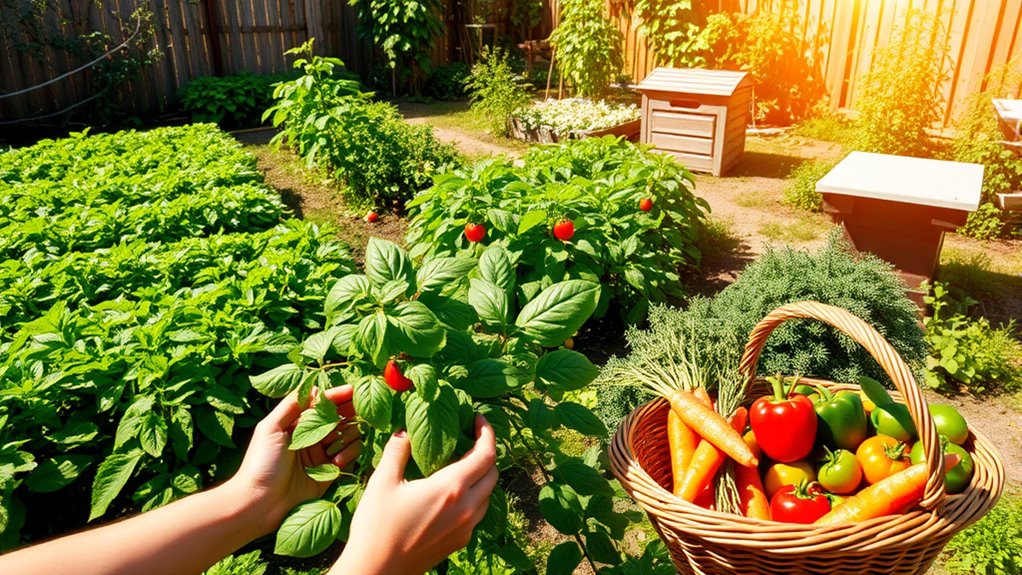
By cultivating your own food, you can substantially cut down on grocery expenses and make the most of your gardening efforts. Implementing cost saving strategies in your garden helps keep your budget in check while maximizing harvests. Focus on budget friendly gardening techniques, such as starting with easy-to-grow vegetables, using recycled materials for containers, and composting to reduce soil costs. Growing your own produce also eliminates the middleman, saving you money compared to buying from stores. Planning your planting schedule and choosing high-yield crops can further boost savings. Additionally, sharing seeds and seedlings with neighbors fosters community and cuts costs even more. Incorporating Hyundai Tuning techniques to optimize your garden tools and equipment can enhance efficiency and productivity. Utilizing cost-effective gardening methods, such as drip irrigation and natural pest control, can further improve your garden’s overall efficiency and savings. Exploring specialized planters, like vegetable pots, can provide tailored environments that promote healthier growth and higher yields. Moreover, implementing vegetable juices into your diet can improve your overall health and reduce medical expenses. Incorporating efficient garden maintenance practices ensures your garden remains productive with minimal effort and cost.
Ensuring Food Quality and Safety

When you grow your own food, you have control over pesticides, ensuring your produce is safer to eat. You also get to pick harvest times that maximize freshness and nutrients. Additionally, growing your own food can contribute to a safer environment, reducing reliance on chemical pesticides and promoting sustainable practices. Moreover, cultivating your own garden can increase your awareness of nutritional content, helping you make healthier dietary choices. Growing your own food also supports local food systems, which can further enhance food safety and freshness. Engaging in home gardening can improve your understanding of food sources and quality, fostering better health habits. Incorporating sustainable practices into your gardening routine can further benefit both your health and the environment.
Control Over Pesticides
Have you ever wondered how to guarantee your home-grown produce is safe from harmful chemicals? Controlling pesticide use is key. You can do this by understanding pesticide regulation, which sets limits on chemical application, and by seeking organic certification, ensuring your plants are grown without synthetic pesticides. Growing your own food gives you direct control over what goes on your plants. Use natural pest control methods, like companion planting or organic sprays, to minimize chemical exposure. Here’s a quick comparison:
| Aspect | Conventional Gardening | Organic Gardening |
|---|---|---|
| Pesticide use | Allowed within limits | Not permitted |
| Certification | Not required | Organic certification |
| Chemical exposure | Higher risk | Lower risk |
| Pest control methods | Synthetic chemicals | Natural methods |
| Food safety | Varies | Higher assurance |
This control helps ensure your food is safer and free from unwanted chemicals, especially when you understand pesticide regulation and how it influences food safety. Additionally, staying informed about regulatory compliance can help you adopt best practices for safe food production.
Freshness and Nutrients
Ensuring your home-grown produce is fresh and nutrient-rich begins the moment you harvest it. Healthy soil is key, as rich soil with good soil health provides essential nutrients directly to your plants, boosting their flavor and nutritional value. Incorporating soil amendments can further enhance soil quality and plant growth. Choosing a diverse crop variety also helps, as different plants develop unique nutrient profiles, making your harvest more nutritious. When you pick your vegetables and fruits at peak ripeness, they retain maximum freshness and vitamins, unlike store-bought produce that may sit for days. Proper timing and handling preserve nutrients and prevent spoilage. Additionally, practicing companion planting can improve plant health and yield, contributing to more nutritious produce. Maintaining soil health through crop rotation and organic matter addition supports ongoing plant vitality and nutrient density.
Promoting Physical Activity and Exercise
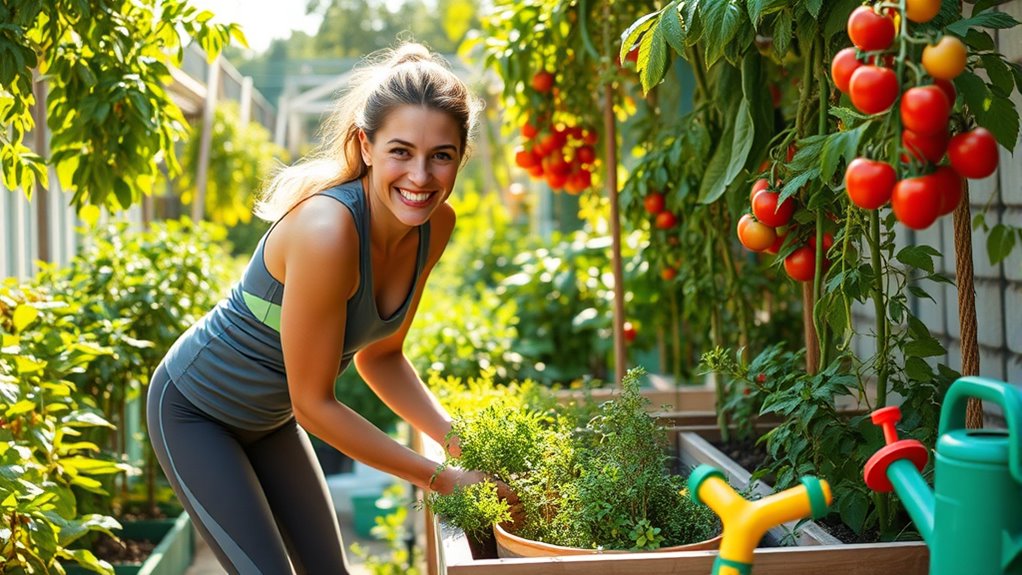
Why not turn your gardening efforts into a fun way to stay active? Gardening encourages physical movement and boosts your fitness. To maximize benefits, focus on these three activities:
Transform gardening into a fun, active way to boost your fitness and build a healthier lifestyle.
- Design your garden layout—dig, till, and arrange beds, which improves strength and flexibility.
- Maintain pest management—regularly inspect plants, weed, and prune, keeping you moving and engaged.
- Implement efficient watering and harvesting—carrying water and picking produce adds cardio and muscle work.
Each task keeps you active, helping you burn calories and strengthen muscles.
Plus, these activities promote better posture and stamina. Gardening isn’t just about growing food; it’s about building a healthier, more active lifestyle while tending to your garden.
Supporting Mental Well-being and Stress Relief

Growing your own food can boost your mental well-being by offering a calming connection to nature. Spending time in your garden helps you feel more centered and reduces stress.
Practicing mindfulness while gardening turns the act into a peaceful escape from everyday worries.
Nature’s Calm Effect
Have you ever noticed how spending time in your garden instantly calms your mind? Gardening offers a natural stress relief by connecting you with nature’s serenity. Your garden’s aesthetics can create a peaceful retreat, reducing anxiety.
Plus, attracting wildlife like birds and butterflies boosts your mood and adds lively charm. Here are three ways your garden fosters calm:
- Engages your senses with colors, scents, and textures, grounding your thoughts.
- Provides a quiet space for reflection and mindfulness, easing mental fatigue.
- Enhances overall mental well-being through nature’s soothing presence.
Mindfulness Through Gardening
Have you ever noticed how paying close attention to each step in gardening can help clear your mind? Engaging in garden meditation allows you to focus on your senses—touch, smell, and sight—creating a calming rhythm that eases stress.
When you practice mindful harvesting, you’re fully present, appreciating the effort behind each vegetable or herb you pick. This intentional awareness turns gardening into a form of meditation, helping you disconnect from worries and cultivate mental clarity.
As you tend to your plants, your mind becomes centered, and your body relaxes. Incorporating mindfulness into your gardening routine transforms it into more than a chore—it’s a powerful tool for mental well-being and stress relief.
Learning New Skills and Building Confidence
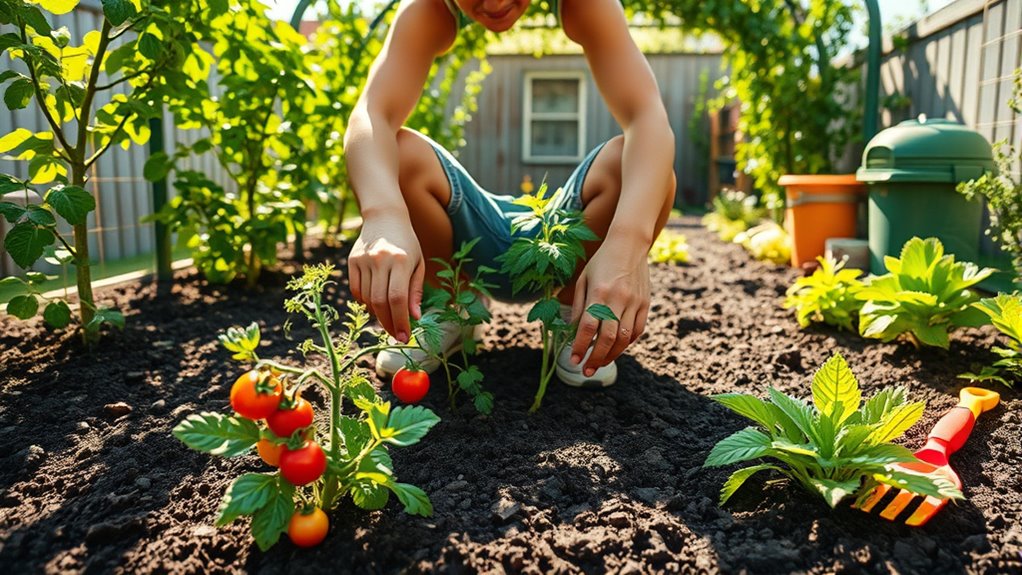
How can you build confidence and master new skills when starting your own garden? By focusing on key activities that boost your knowledge.
First, try seed starting; it teaches patience and precision while giving you control over your plants.
Second, learn composting techniques to improve your soil naturally, which builds your understanding of recycling organic waste.
Third, keep a gardening journal to track progress and troubleshoot issues, reinforcing your growing expertise.
As you experiment with seed starting, you’ll gain confidence in nurturing seedlings.
Mastering composting techniques helps you see the direct impact of your efforts on plant health.
Each success encourages you to take on new gardening challenges, making the process rewarding and empowering.
Over time, you’ll develop skills that transform your garden into a thriving, sustainable space.
Contributing to Environmental Sustainability

By growing your own food, you actively reduce your environmental footprint and promote sustainability. You can implement composting practices to recycle kitchen scraps, enriching your soil naturally and decreasing waste sent to landfills.
This reduces methane emissions and promotes healthier plant growth. Additionally, cultivating a diverse range of fruits and vegetables helps preserve biodiversity by supporting various pollinators and beneficial insects.
Growing a variety of crops minimizes the need for chemical pesticides and fertilizers, which can harm ecosystems. Your efforts contribute to a more resilient environment, encouraging natural cycles and reducing reliance on industrial farming methods.
Creating a Sense of Community and Connection

Growing your own food naturally fosters a sense of community and connection, as it encourages sharing knowledge, resources, and harvests with others. This creates opportunities for community bonding through shared experiences.
You might:
- Organize local gardening groups to exchange tips and seedlings.
- Host harvest festivals that celebrate collective effort and abundance.
- Collaborate with neighbors to develop community plots, strengthening relationships.
These activities help you build trust, learn new skills, and enjoy the satisfaction of working together. Creating this sense of connection not only boosts your social well-being but also inspires others to start growing their own food.
Ultimately, cultivating a community around gardening turns individual efforts into a shared journey toward sustainability and mutual support.
Frequently Asked Questions
What Are the Best Crops for Small Urban Gardens?
For small urban gardens, you should focus on crops ideal for container gardening and vertical planting.
Choose compact veggies like cherry tomatoes, herbs such as basil and mint, and leafy greens like lettuce and spinach. These thrive in limited space and are easy to manage.
Use vertical planters to maximize your area, and container gardening makes it simple to grow fresh produce right on your balcony or patio.
How Much Time Does Maintaining a Home Garden Typically Require?
Imagine the peaceful moments in your garden, but wonder how much time you’ll need for garden maintenance. Typically, maintaining a home garden requires a manageable time commitment—about 1-3 hours weekly, depending on its size and plant variety.
You’ll spend time watering, weeding, and harvesting, but it’s flexible and rewarding. With consistent care, your garden thrives, and you enjoy fresh produce without it taking over your schedule.
Can Growing My Own Food Help With Allergies or Sensitivities?
Growing your own food can aid allergy relief and sensitivity management by giving you control over what you grow. You can choose hypoallergenic plants and avoid pesticides or chemicals that trigger allergies.
Plus, handling your garden regularly can build immunity and reduce sensitivities over time.
With fresh, organic produce at your fingertips, you’re likely to experience fewer allergy symptoms and enjoy better overall health.
What Legal Considerations Are There for Urban Gardening?
When you’re urban gardening, you need to consider local laws and regulations. Check urban zoning rules to see where you can garden, especially if you’re planting in shared spaces or on rooftops.
Also, be aware of pesticide regulations, which might restrict certain treatments to keep community environments safe. Staying informed ensures your gardening efforts comply with legal standards and helps you avoid potential fines or conflicts.
How Can I Start Composting Effectively at Home?
Did you know that composting can reduce your household waste by up to 30%?
To start effectively, choose a well-ventilated spot for your compost bin, ideally on bare soil to encourage beneficial organisms.
Be mindful of composting pests—cover food scraps and avoid adding meat or dairy.
Regularly turn your compost to aerate it, speeding up decomposition and creating rich soil for your garden.
Conclusion
Growing your own food isn’t just about saving money or eating healthier; it’s about planting seeds of joy and resilience in your life. As you nurture your garden, you cultivate more than plants—you grow confidence, community, and well-being. Like a compass guiding you toward sustainability, tending your own food helps you forge a deeper connection to nature and yourself. Embrace this journey, and watch your world bloom with health and happiness.
